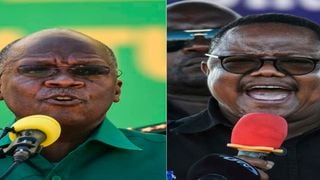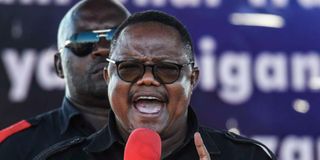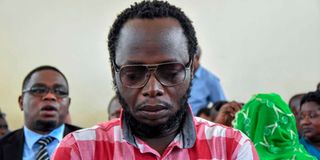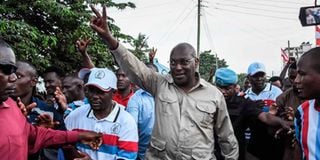
President John Magufuli and Chadema’s Tundu Lissu.
| Ericky Boniphace | AFPNews
Premium
John Pombe Magufuli the ‘Bulldozer’ brooked no dissent
“A senior police officer cautioned me to avoid trouble by avoiding people through staying at home. He felt sorry for me,” a terrified member of an opposition party in Tanzania is quoted as telling Amnesty International in its 2019 report.
That a police officer, who apparently sympathised with the politician would suggest that the leader was safer in self-imposed house arrest than freely mingling with taxpayers who employ him, captured the repression under President John Pombe Magufuli’s government.
And it was not an idle threat — as an incident two years earlier had demonstrated, it was a particularly risky time for government critics.
Tundu Lissu shooting
On September 7, 2017,opposition politician Tundu Lissu had been shot several times by gunmen near his home in the capital Dodoma.
The assailants, who have never been identified, shot him 16 times in the stomach, arm and leg.
Mr Lissu had to undergo more than 20 operations in Kenya and Belgium to recover.
The vocal critic of government corruption who had been repeatedly arrested after run-ins with the ruling party Chama Cha Mapinduzi is still in exile.
With such a tragic encounter, the suggestion given by the senior police officer to the politician was ominous, and intended to achieve what the regime wanted: frighten critics into silence.

Tanzania’s opposition politician Tundu Lissu who was shot several times by gunmen near his home in the capital Dodoma On September 7, 2017.
Repression
Since the election of Magufuli as President in 2015, Tanzania’s human rights record had deteriorated with a brutal campaign of repression targeting journalists, human rights defenders and political opponents.
“In the four years since President John Magufuli became president of Tanzania, the authorities have ramped up repression against peaceful dissent and perceived government critics,” Amnesty International wrote in the report released in 2019 and titled “The Price We Pay; Targeted for Dissent by the Tanzanian State”.
“Public officials have responded to criticism by intimidating, harassing, arbitrarily arresting and detaining critics of the government,” the report stated.
Authorities had enacted laws to curtail peaceful political activities that undermined freedom of expression, association and assembly.
The banning of several media outlets, restrictions to fact checking and independent research as well as censorship of bloggers through unjustified regulation were other schemes to silence critics.
Crackdown on media
Human Rights Watch World Report 2020 also condemned the state crackdown on media, civil society groups and individuals critical of the government.
In February, last year, the Information ministry had suspended The Citizen newspaper for seven days on accusations of publishing two biased stories.
One had reported on US lawmaker Bob Menendez’s criticism about “the gradual downward spiral of respect for civil liberties in Tanzania,” while the other had raised concerns about the weakening of the Tanzania shilling against the US dollar.
A consistent slide down the ranking of Tanzania in the Reporters Without Borders (RSF) World Press Freedom Index during President Magufuli’s reign highlights the muzzling of the media.
A year before Magufuli, nicknamed the Bulldozer, had assumed office, Tanzania had one of its best scores — position 69 out of 180 countries — which was an improvement from 70 in 2013.
But in 2015 when he took over office, Tanzania fell to position 75, then improved to 71 in 2016 before deteriorating rapidly from then onwards. By last year, the country was ranked 124 out of 180 — its standing dealt a blow by a ruthless purge on independent media.

Tanzanian journalist Erick Kabendera (centre) appears in a Dar es Salaam court on January 2, 2020. As an investigative reporter, he paid a high price for his stories criticising the economy, the government and corruption.
“None of the 180 countries ranked in RSF’s World Press Freedom Index has suffered such a precipitous decline in recent years. Nicknamed the “Bulldozer,” Magufuli tolerates no criticism of himself or his policies,” RSF remarked following the latest ranking in the World Press Freedom Index.
One of the cases cited is that of Erick Kabendera, an investigative reporter who paid a high price for his stories criticising the economy, the government and corruption.
For his criticism, Kabendera languished in prison for seven months following his arrest in July 2019.
New regulations
In 2018, parliament passed the Electronic and Postal Communications (Online Content) Regulations, giving the Tanzania Communications Regulatory Authority (TCRA) wide discretionary powers to license blogs, websites, and other online content.
And in January, last year, the High Court in Mtwara quashed an application by the Legal and Human Rights Centre (LHRC), trustees of the Media Council of Tanzania, and the Tanzania Human Rights Defenders Coalition challenging the regulations.
Even before the amended Political Parties Act, opposition politicians had faced arbitrary arrest and detention on trumped-up charges.
President John Magufuli had, on June 24, 2016, imposed a blanket ban on political rallies until election campaigns last year.

Tanzania’s Chadema chairman Freeman Mbowe (centre) arrives at the party's headquarters on March 14, 2020 after being released from Segerea prison in Dar es Salaam.
Opposition leaders
Politicians were restricted to holding their activities in their respective constituencies only, and the Tanzania Police Force brutally enforced the decree.
Nine leaders of the main opposition party, Chama Cha Demokrasia na Maendeleo (Chadema), are currently facing charges for sedition, incitement to violence, and holding an “illegal rally” in February 2018.
Among those who have been jailed since November 2018 are Chadema politicians Freeman Mbowe and Esther Matiko.
On May 5, last year, armed men abducted Mdude Nyagali, an opposition activist, as he left work in Mbozi in western Tanzania.
According to a statement from Chadema, Nyagali was found four days later at Inyala, about 150 kilometres away from Mbozi, seriously injured. He was unable to speak.

Tanzanian ex-MP Godbless Lema (left) with his family and the Chadema party chairman Freeman Mboye in Nairobi shortly before his departure for Canada.
Chadema MP for Arusha, Godbless Lema, was detained for four months at Kisongo prison following his arrest on November 2, 2016. The lawmaker had been arrested outside the parliament gate in Dodoma.
He was charged with incitement against the government and the head of State for his statements in parliament and in public on October 22 and 23, 2016, respectively.
Police reported that Mr Lema claimed that President Magufuli would not live to see the country’s next general elections because of his oppressive rule.
In the charge sheet, Lema was quoted in Swahili as saying, “[…] if President Magufuli continues his habit of suppressing democracy and opposition leaders, there is a day that this country shall be steeped into bloodshed … Any president who does not respect the rule of law, [and] constitutional guarantees, that president shall lead the nation into the tragedy of bloodshed, people shall be dissatisfied, and if they decide to rise in resistance, neither the police nor the army shall be able to control the lawlessness that shall ensue…”





